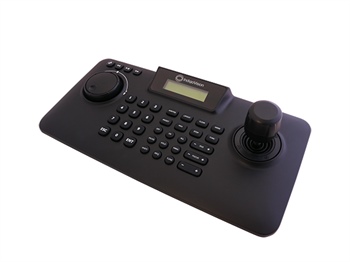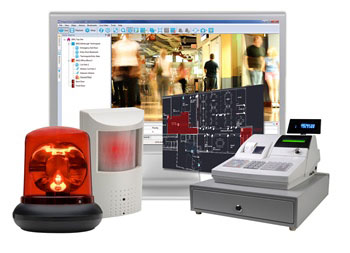
5 real-life security management scenarios that Agora improves
No matter what industry you work in, Whether it's airport security, casino surveillance or bank security, many of the real-life security management scenarios you face will be similar to those of other operators. Here, we outline five of the most common – or dangerous – incidents you could come across in your role, and demonstrate how Agora’s clever security management tools would tackle them.
It isn’t good enough any more to merely have top-of-the-range cameras and monitors, or the most recent video analytics software. The new Agora software offered by IndigoVision adds another layer of command and control to your video management system. Organizations need security systems consolidation for all of their platforms – from intruder control to fire alarms – in one simple interface.
So how could your time in the control room change as a result of implementing Agora? With insights from Bernardo Motta, Agora’s International Business Development Manager, we take a closer look.
Problem 1: You’re training a new security operator
Does your staff onboarding process look complicated and time consuming right now? If new security operators have to learn multiple tools just to get to grips with their role in the control room, then chances are there’s room for human error. If it’s a convoluted process, it probably takes too long for new team members to get used to their role. The learning curve is steep and long. This leaves your business vulnerable to omissions and errors done in the meantime as new employees adjust to their new role.
How Agora helps
Agora helps existing members of the team to simplify their processes as well as those who are new to your business. By offering written security procedures on an easy-to-use interface, Agora walks newcomers through each step of your agreed response protocol (which can be customized by each company) no matter how straightforward or unique the scenario might be. Bernardo Motta says:
If you imagine rookie guards on their first day of the job, making them acquainted with Agora is very simple and intuitive. You’d just tell them to pick alarms from the queue on the left-hand side. If they prefer, they can instead pick alarms from the map. Then they just need to do what they're told on the right-hand side where the instructions appear in a step-by-step manner. It totally removes the need for dedicated operator training sessions.
The ease with which inexperienced operators are up to speed with Agora means that line managers are freed up to do their jobs, and that each new team member will quickly deliver consistent results with no deviations from the response plans. Operators won’t need to be trained in the underlying security and safety equipment either, as all security operations are done in Agora.
Problem 2: You have tired, over-busy or stressed security operators
No matter what’s going on in a security operator’s life away from work, you want them to feel alert and supported in the control room. In the security sector, organizations need reliable, switched-on guards who can offer a consistently high level of service. Working shifts, long operating periods and monotonous night hours can affect an operator’s concentration and focus, so businesses may be increasing risk by not providing control room operators with an easy-to-use software offering standard step-by-step procedures.
How Agora helps
Agora means operators don’t have to think about what to do in stressful scenarios, and don’t have to worry about getting things wrong. The steps shown on the screen in front of them are exactly the same as the ones their colleagues are shown during their shifts. Bernardo Motta explains why inconsistencies can creep into control room security operations:
You might be a highly trained guard with 15 years of experience, but if you just became a father, and your baby was crying the whole night so you only slept two hours, you might be facing the worst day of your life if that happens to be the day there is a fire or a terrorist attack. Businesses need the same sort of prompt response from this operator, as his well-rested colleague would deliver, regardless of his stamina or whether he is totally motivated, aware and alert.
Agora reduces the chance of human error, giving operators a helping hand when they need it most.
Problem 3: You’re faced with an unusual security situation
When an unforeseen, irregular security breach such as fire, intruder or terrorist activity occurs, even the most experienced operator might panic. It might have been a long time since their training, and if one or more of the underlying systems are new, they might not know how to use every tool confidently. This is key when a security officer is under pressure; and the last time they ran a drill to rehearse a given response plan might have been too long ago to be delivered assuredly now.
How Agora helps
Agora walks an operator through even unusual scenarios, offering them support in their most difficult moments. You can write your own response plans on Agora, from the most mundane, everyday situations, to the rarest emergencies that require the most demanding response. Bernardo Motta explains how Agora guides you through any type of occurrence:
I like the analogy of Agora acting like a co-pilot for security operators. Nowadays a pilot that's flying a commercial airplane doesn't usually panic when something goes wrong because there is this autopilot system to help sort things out, as well as a co-pilot, another highly trained human being, right there in the cockpit. Now, apply this analogy to security operations: with Agora offering easy step-by-step instructions, adapted to each situation, operators can stay focused on their work, without being worried about what to do next, because Agora is there to help them deliver a uniform and prompt response every time.
Having a straightforward decision support system during a crisis really does pay dividends, not only in the quality of the actions that are delivered, but in the wellness of the operator, who knows that help is always there to back him up when he needs it.
Problem 4: A team member at your organization can’t gain access to your office
Everyday security incidents, such as these, take up a lot of the security officers’ time: access control management, system monitoring and responding to alarms. In a physical access control exception, remote operators must validate whether access should be granted to a given person that is being denied access by the access control system. This diverts focus away from other important patrolling and proactive monitoring tasks.
How Agora helps
Agora’s powerful integration abilities come into play in this scenario: through a video feed, the security operator can view the person who is stuck at a door, gate or turnstile. By using an intercom, the operator can talk with the person to validate the ID. Bernardo Motta explains why this feature is so beneficial to security operations:
If you receive in Agora a card error exception from an access control system, you will have access to features like searching for a that person in the access control database. So, if someone is trying to get in and their card is throwing an error, you can talk with that person on an intercom, they can explain who they are and their department, and you can search for them there and then, allowing them access with the push of a button if they are authorised.
As well as offering standard security procedures, Agora works with deeper bidirectional integrations to go beyond what you can achieve through a regular video management system.
Problem 5: You don’t know you have a system failure until it’s too late
One of the most problematic occurrences for organizations is when they only realize they have a technical fault in a critical system when it’s too late. If an early detection system or a surveillance system isn’t working properly, it usually isn’t until there's a breach that you are aware of that weakness or fault. Businesses need constant background health monitoring which identifies any system fault or outage as soon as it happens.
How Agora helps
Officers need to be alerted the second a system is down so they can run tests, pinpoint the issue and report it to the team in charge of resolving it. When the weight of the whole organization’s security and safety is on your shoulders, you need to be able to act fast, and have access to the right tools that help you do your job. Bernardo Motta continues:
If a camera has just lost signal or there’s a panel with a power fault that’s running on a low battery, Agora can offer the right response plan to be followed as soon as the issue is detected. First of all, operators need to establish if the fault is for real. Agora helps there by cross referencing any fault information with video footage, current system status, and past faults logged in the platform that would show if the situation is recurrent or not. Response plans will typically include actions to phone or email the right technical person, so that technical faults are acted upon and the loop is closed.
You need to be quick to react to a failure in one of your critical security or safety systems, and a field technician needs to be called promptly once you know you have an issue. A high volume of technical faults comes into the control room every day, so having Agora really helps you manage these repetitive processes in an effective and consistent manner.
Whichever security scenarios are consuming most of your time, or proving the most difficult ones to handle, or posing the biggest threat to your organization, Agora is there to provide an easy and effective response plan, while guiding operators step by step on how to handle each scenario.







